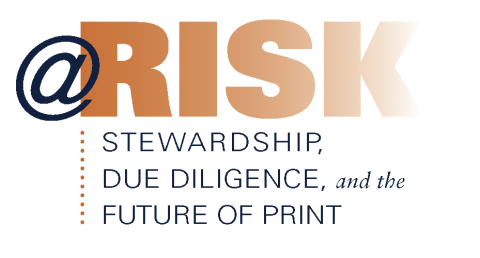The evidence is clear that the integrity of the vast, encyclopedic print serial collections built and long maintained by North American libraries is now in jeopardy. Pressure on libraries to reduce print holdings and reallocate space to other uses is intense and growing, increasing the likelihood that important materials will be lost in the process. With the aging of the print corpus, moreover, physical fragility and inherent vice loom as ever larger threats.
Discussions at CRL’s April 2016 collections forum @Risk: Stewardship, Due Diligence and the Future of Print and subsequent conversations with individuals at libraries, universities, and funding agencies suggest that prompt and decisive action is needed to ensure that the rich and unique legacy of centuries of library investment endures. Therefore CRL will allocate new resources in a sustained effort to shift the onus of preserving the “critical corpus” of published serial literature from individual libraries to the collective. The shift will, over the next ten years, radically reduce and redistribute the costs of maintaining the corpus, while generating new benefits for North American scholars and libraries.
Specifically, CRL will:
- Substantially expand the scope and improve the quality of the shared collections. CRL will invest in print sharing efforts that combine preservation and strategic collection development, identifying and assembling secure and well-curated serial collections and working to improve their quality, integrity and comprehensiveness. This will entail actively identifying materials of interest, filling gaps in serial holdings, gathering and analyzing detailed data about holdings and repositories, and other measures to ensure the long-term integrity and completeness of the shared collections.
- Merge preservation and electronic access. Because the benefits of archiving are multiplied when accompanied by services like digital access and interlibrary loan, CRL will significantly increase the number of important serial titles that are both adequately preserved and digitally accessible to North American libraries. This will involve investing heavily in systematic, progressive digitization of shared CRL collections as well as in digitization driven by scholars’ requests.
- Create and promote a “CRL consensus” on the scope, norms and standards of print stewardship. Sustainability requires clear and realistic strategic goals. CRL will limit its shared print investment to printed serials, i.e., printed journals and newspapers (and will exclude monographs and U.S. federal government publications). Within this domain CRL will identify a “critical corpus” of print serials worthy of preservation, as the basis for deciding the scope, priorities and timetable of its shared print investment. The immense pool of knowledge, experience and expertise of the librarians and scholars in the CRL community will provide an intellectually defensible basis for decisions on the appropriate level of redundancy, service, transparency, and care of the shared collections.
- Forge and formalize new partnerships to achieve greater scale. CRL is the largest, but not the only, shared print effort in North America. To meet its goals and optimize the return on participating libraries’ investment, CRL will endeavor to negotiate and formalize the terms of a rational division of labor between CRL, “libraries of record” and other credible print sharing efforts supported by CRL members.
- Articulate and promote a clear and convincing narrative for scholars and funders. Despite new budgetary constraints librarians remain answerable to scholars for whom access to the physical artifact continues to be indispensable. Therefore the supporting narrative of North American print sharing must emphasize the “new goods” that the preservation efforts create, to counter the perception that managing down library collections necessarily entails the loss or degradation of scholarly assets. CRL will articulate a supporting narrative and will actively promote the new goods and their benefits for scholars.
Bernard F. Reilly
President (2001-2019)
Center for Research Libraries
